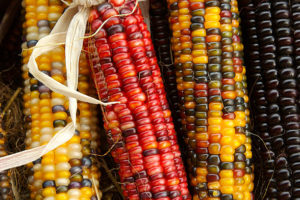
“Think about it,” he continued. “Get up at the break of dawn to cut trees and remove the stumps before you can plow the fields. Then do that every morning until the fields are planted and you can have the pleasure of not planting for a while, but weeding and getting rid of rocks instead. Then between tending to the young plants and keeping the rabbits, weevils, and deer at bay, you keep busy watering, watering, or worrying about too much or too little rain, all the time praying for the harvest season to arrive ahead of the locust, so you can start getting up before dawn to do that. Then comes storing the grain or potatoes or whatever. Usually there’s drying, sorting, not to mention separating the seed for next year, plus keeping an eye on mice and insects that want their fair share. Did I mention drying the fruit, like making raisins out of grapes, or prunes out of plums so they can be stored? If you’re lucky and the fungus didn’t hit too hard and the mice and bugs left some, then there should be enough food for someone to distribute, making sure each family gets a fair share, only never as much as they want. After all, it has to last until the next harvest. When it’s all said and done, someone has to organize the men, post guards and protect the stored food from the neighboring tribes who were sometimes itching to get their hands on it, especially if they had a bad year. Then, four years later the land is so used up, it won’t even grow weeds, besides no more trees or fuel nearby, so you have to move the fields to another spot and start all over. It’s a wonderful life.
“Compare that to our hunter gatherer who sleeps late, sends his wife and daughters out to the inlets at low tide with a basket to gather what’s there. An hour or two later he’s had his breakfast. And not just any breakfast, but the kind of breakfast few people in Europe can afford: fresh clams, mussels, crabs, fish, eggs, fresh everything unless it’s smoked, which is often better. Then he steps outside the wigwam, looks up, stretches, and decide it’s time for a nap. The women bring the firewood, always plentiful, because it’s from the branches that drop to the ground naturally, never from trees you chopped down. Plus driftwood. And there’s tons of that.
Once or twice a month he goes hunting for seals at the colony and brings the young boys along. They can play and gather eggs on the way, then return with full baskets on the way home. His main work is bringing the seal meat back as well as the pelts. Hunting seals or other marine mammals is no problem, as they are so plentiful he has to be careful not to trip on them. Occasionally when he gets tired of seal meat, he goes inland, hunting for fox or guanaco, which provides a good change of diet, in addition to a different type of pelt. Even so, he only goes during good weather because it usually means staying out for a night or two.
“Or he goes fishing. Spear fishing is good, as well as bow fishing. Both fun, and easy at low tide since there’s enough fish flopping in the many shallow pools to feed an army. Using bone hooks is sometimes better at high tide, and either way, he catches more than he’ll ever need. Did I forget the King Crab? From the rocks where I stood yesterday, I could see an endless army of those, all marching along the coastline, and not more than three feet under water. Add that to the list of delicacies he could jump in a grab until his arms turned blue. All of it sustainable, by the way, since there was never enough people to be a meaningful drain on available resources.
“Think of how free people were before agriculture. No plowing, no hoeing, no weeding no watering no worrying about the locust or wild pigs eating your crop or the drought killing it. Nothing. Just hunt and gather for a few hours, then spend the rest of the day and evenings grooming each other, watching the children play, while telling jokes and glorified hunting stories by the campfire.”
I could only smile. Antonio had parts of human social history all figured out. “I didn’t know we had King Crab right along our shoreline.” I managed to say.
“You do now, and you get to try some. I brought back a bag full. That’s our dinner tonight.”
“But what about man’s worst discovery, agriculture? How is that tied in to our drug dealers?”
“Simple. Basically, nothing here happens by accident. The Onas didn’t come here by accident. They came here because, in my opinion, they saw nothing to like in agriculture. The drug dealers are here because there’s something that attracts them. And it’s not King Crab. Maybe in the morning we can go look from the air and see if we can spot the reason.”
From In the Land of Fire

